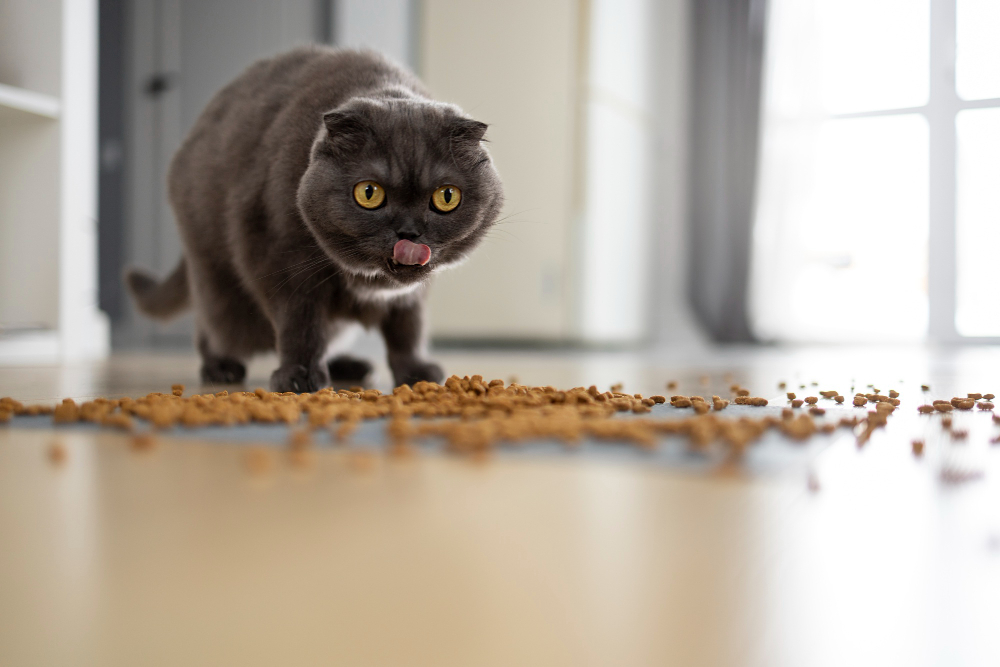Why Is My Cat Always Hungry But Skinny. If your cat eats a lot without gaining weight then he is likely infected with a set of worms tapeworms, roundworms, and hookworms that can lead to him eating more than usual which may make you think that he needs more food than he actually does.
When diabetes, hyperthyroidism, and inflammatory bowel disease are experienced by the cat there can be less absorption of nutrients from said food leading to a rapid increase in consumption but little to no gain in weight.
As well as this another family pet may be coming into your house at mealtimes and eating your cats ‘meals’.
Why Is My Cat Always Hungry But Skinny
Cats are stunning in any form, but you might notice some parts of your cat maybe a little on the thin side which is an alarming sign. Being too skinny can also be a red flag for underlying health problems in cats. And what’s even worse? Cats that are too skinny or lose weight suddenly might have problems with digestion. Here are several reasons your cat might be too skinny.
Food Quality
In this scenario, one of the first things that you need to check is the quality of his food. Besides quantity, quality plays a critical role in your pet’s health.
To ensure optimum nutrition, your cat should get 200 kcal per day during its growth period. An adult cat needs between 240 and 280 kcal daily with pregnant or nursing females needing more as they provide for their kittens’ caloric requirements.
If your cat has a medical procedure like spaying or neutering, her caloric intake also needs to be adjusted downward following the procedure otherwise she could end up overweight or obese.
Hyperthyroidism
This condition is commonly seen in older kitties. It gives us a good example of an overweight, hungry cat these pets often have quite pronounced weight loss, yet they have an active appetite and are seemingly not aware that they’re underweight.
Sometimes other symptoms may be seen as well such as belly upsets, changes in behavior or attitude, increased thirst, and a heightened pulse rate.
Hyperthyroidism is caused by the overactive production of the thyroxine hormone.
Old Age
As your cat ages, it tends to lose weight and why is that, you ask? Well, in all cats old and young, old age results in certain metabolic changes.
The geriatric cat’s digestive functions deteriorate as it gets older just as do those of humans and their digestion might not be entirely efficient.
Because their digestion isn’t up to par, this could explain why senior kitties don’t necessarily benefit from the same appetite they once had when younger.
Boredom
Cats are always hungry, and a meowing cat can be very annoying when it wants to eat- just about every two or three hours.
Some cats never stop asking for food, but then again maybe they don’t really want to eat- this means that they want something else from you.
Cats are indoor animals and there is no doubt that confinement has negative effects on their health as well as behavior.
You either have to give them the kind of entertainment which will keep them active, or else try petting them, giving them treats, and even playing repetitive games with them.
The only alternative is living with a cranky old cat who doesn’t smile and try to make the best of things.
Eating schedule
Another consideration you’ll want to make before bringing this furry friend into your home is the feeding schedule.
Cats have very specific habits of what time they’ll eat and how often and a sudden change like trying to start them out going once a day can be disastrous because if they get hungry enough, they’re going to break into the pantry just like any other junk food addict would!
Kittens should ideally be fed 3x per day as that’s what their little tummies need in order to grow.
Once your cat reaches 6 months or so, you might shift them over to 2x daily, and then once they are grown adults they may either stick at two meals or continue at one.
Final Words
Keeping in mind the gradual nature of weight loss, it can sometimes be hard to notice if your cat loses weight. This is why you’ll want to look for physical and behavioral signs that tell you your kitty might be underweight or deteriorating. Plus, pay attention to the type of food your cat gets as well as her parasite medication schedule and monitor any physical changes such as coat appearance, teeth condition, movement, and sleeping patterns.
